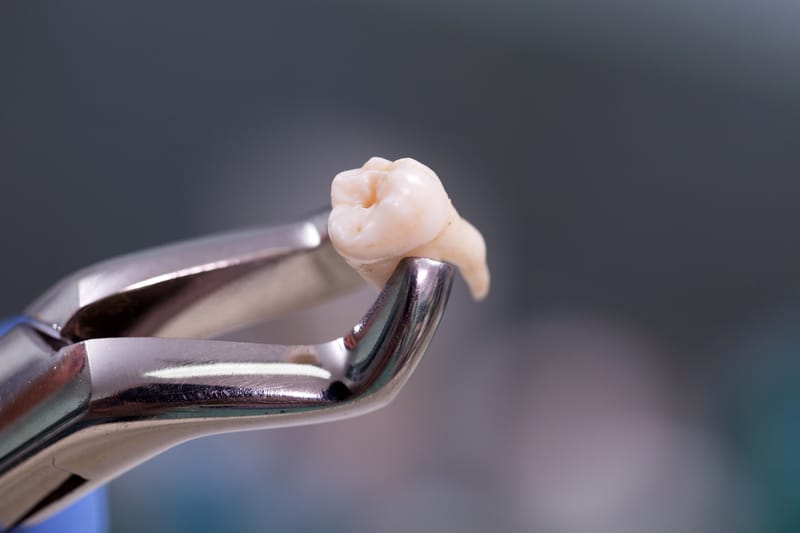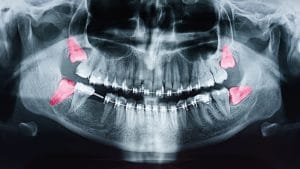What Are Wisdom Teeth?
The Evolution of Digital Dentistry
April 12, 2019What To Expect At Your Next Dental Checkup
April 26, 2019One of the most common dental procedures that most patients will experience will be removing wisdom teeth. From babyhood to adolescence, teeth are always erupting, and as you hit early adulthood, you may begin to see or feel your wisdom teeth growing in. Although their function is debated, wisdom teeth typically need to be removed as they tend to cause pain and discomfort in the mouth. For patients with braces, wisdom teeth are normally removed at the end of treatment. If you or your child is experiencing pain or discomfort at the back of your mouth, you may be having problems with your wisdom teeth. Learn how to handle your incoming wisdom teeth and what options you have with this guide!
Functions of Wisdom Teeth
Teeth erupt in various stages as we age, from first incisors to canines, premolars, molars, and lastly, wisdom teeth. Called third molars, wisdom teeth begin developing at the back of the mouth between the ages of 17 and 21 and are named in accordance with the age that most people are deemed mature. Whenever they erupt in the mouth correctly, wisdom teeth are beneficial at helping you chew. Many people never have a problem with their wisdom teeth, but others can suffer from pain, discomfort, and even infection, if not treated. Most patients will develop four wisdom teeth in total behind the molars on both sides of the upper and lower jaw. In some instances, these teeth may only partially erupt or stay buried underneath the gum tissue. Whenever this occurs, those teeth that don’t appear are considered “impacted” and can cause major problems.
Wisdom teeth can cause additional problems whenever there isn’t enough space for them to surface or if they erupt in the wrong position. As wisdom teeth begin developing, dentists look for certain signs to monitor correct/incorrect movement. Incorrectly formed or misplaced wisdom teeth can cause issues, such as:
- Crowding or damaging nearby teeth
- Pain, swelling, and stiffness in the jaw caused by infection
- Difficulty flossing between wisdom teeth and the molars next to them
- Damaged roots and bones from cysts that develop on impacted teeth
Although their function is debated, wisdom teeth may have been useful to ancient ancestors whose diets were much different than ours today. Since our diets are softer, wisdom teeth don’t play a significant role like they used to in the past whenever they would replace molars that had been worn down. The pain they cause and their lack of significant benefits typically leads most patients to remove their wisdom teeth.
Why It’s Healthy To Get Them Removed
While the discomfort that wisdom teeth cause is a major contributor to their removal, there are other reasons why, in most cases, it’s important to have your wisdom teeth removed. Wisdom teeth cause other teeth to shift and affect bones in the mouth, so if there is any evidence that your mouth is changing, visit with your dentist as soon as possible. Some noticeable changes that can be evident include pain, infection, cysts, tumors, gum disease, damage to neighboring teeth, and tooth decay. Wisdom teeth may also need to be removed as part of treatment for braces or other dental procedures that require more room in the mouth. Occasionally, wisdom teeth will be removed after braces are removed, but it depends on the individual. If you aren’t having trouble with your wisdom teeth and decide to keep them, it is important that you still be monitored often as complications can still arise later on. Just as people have more health problems as they age, you are not exempt from future issues with your wisdom teeth as they age. To make sure that your wisdom teeth are as healthy as possible, make sure to thoroughly floss around each one and have regular checkups with your dentist.
What To Expect From Wisdom Tooth Extraction
As you prepare for yourself or your child to have wisdom teeth removed, your dentist will consult with you about what options to pursue for the best treatment possible. Typically, a consult will consist of an oral examination along with X-rays to identify problematic teeth and possible courses of action. Dentists most often prefer to remove wisdom teeth during the late teens and early 20s before the teeth’s roots have solidified into the jawbone. Wisdom teeth can still be removed at an older age, though, but carry the risk of damaging major nerves in the jaw. Most wisdom teeth removals involve some type of sedation, such as intravenous (IV) sedation and nitrous oxide (laughing gas). These sedation treatments help relax patients so that the dentist or oral surgeon can easily maneuver dental instruments in the mouth and extract teeth without problem. Younger patients recover faster from sedation treatments, as well, which is another benefit of having wisdom teeth removed at an earlier age.
For more information on wisdom teeth and how the removal process works, call Stonebrook Family Dental at (303) 872-7907! Our team is ready to help your family get the best oral health treatments out there at the best price possible!




